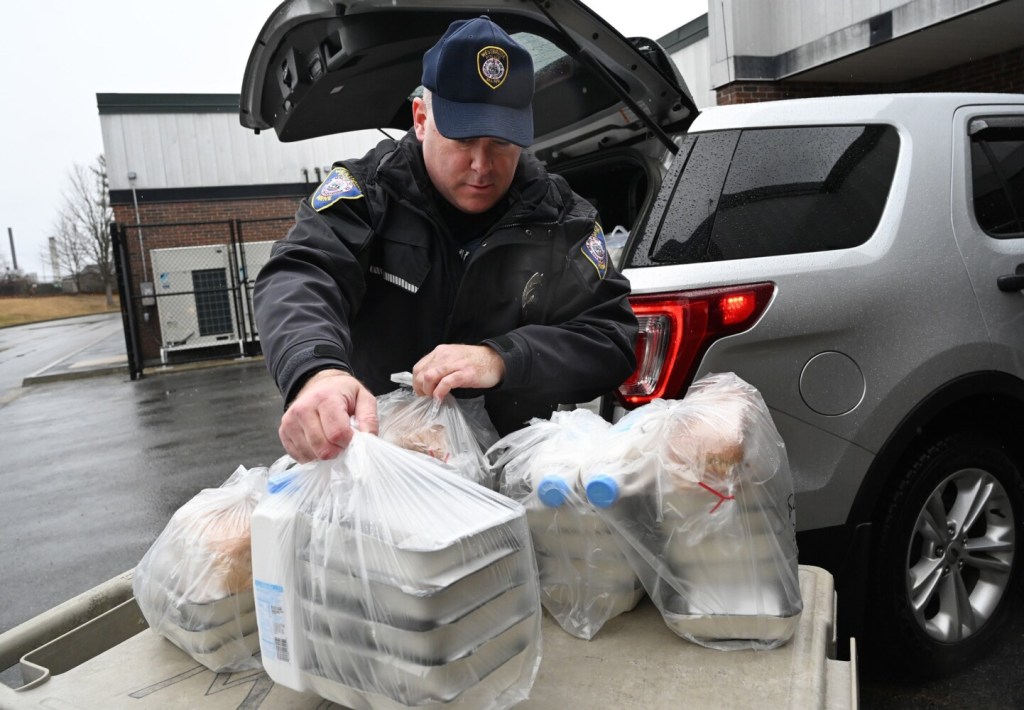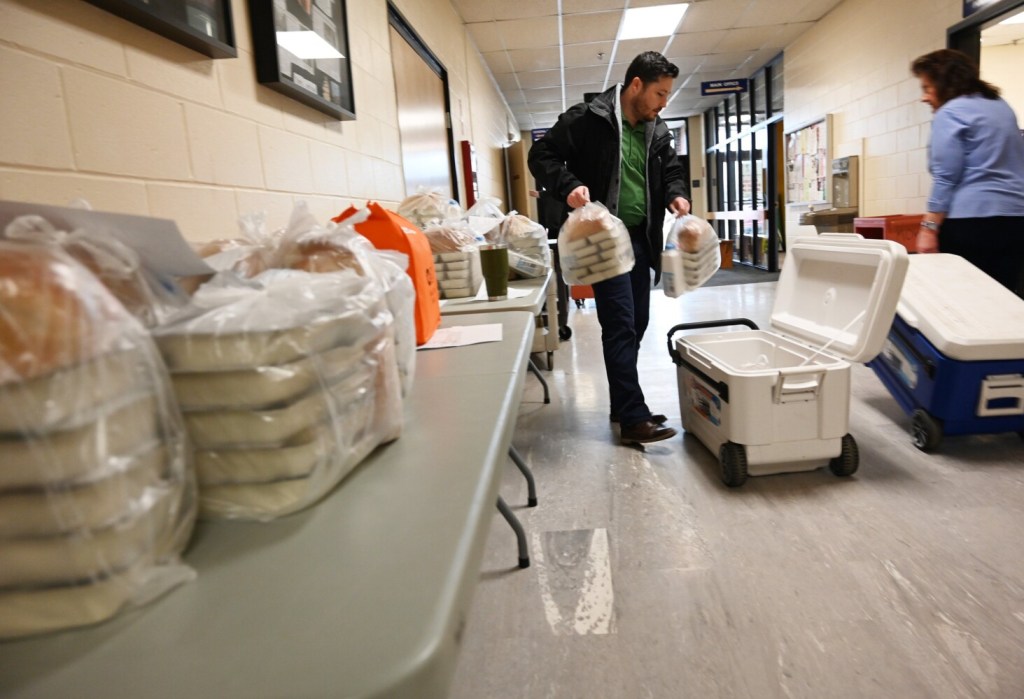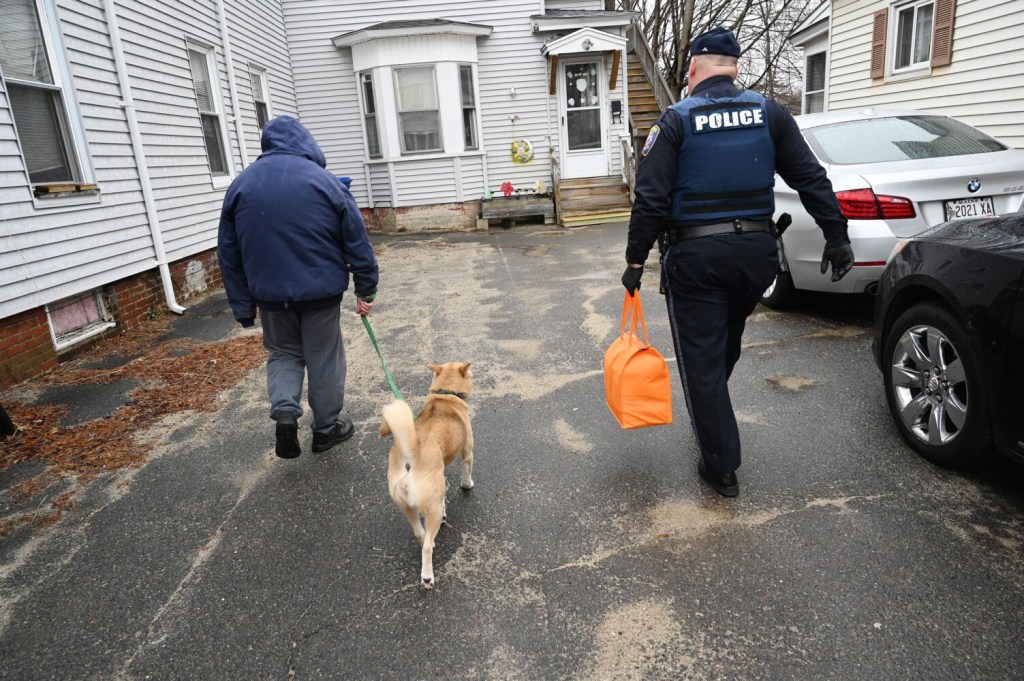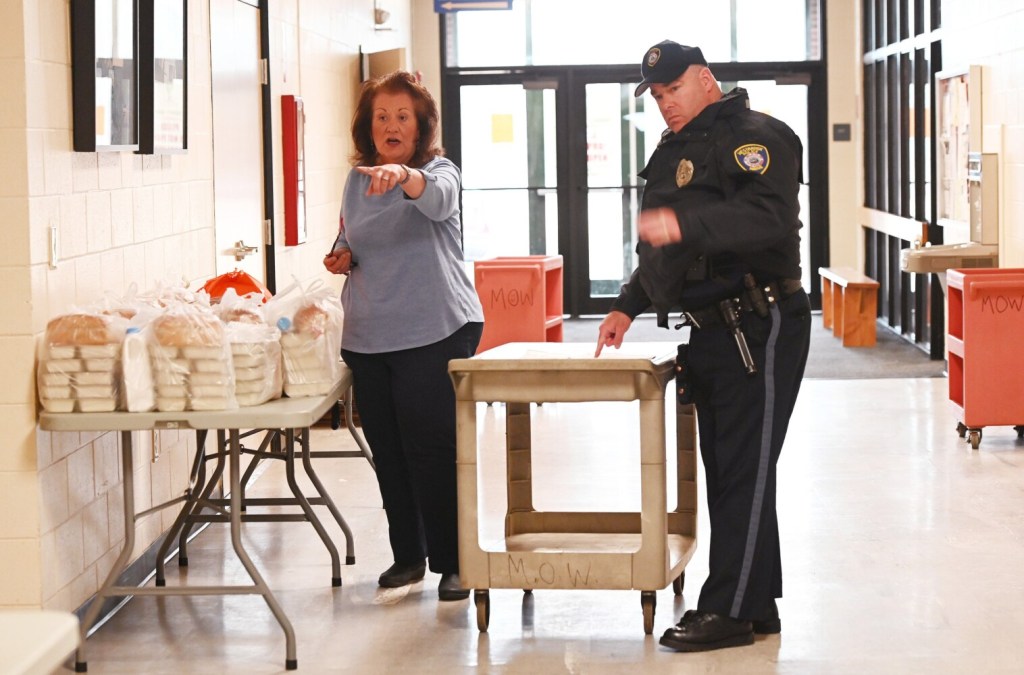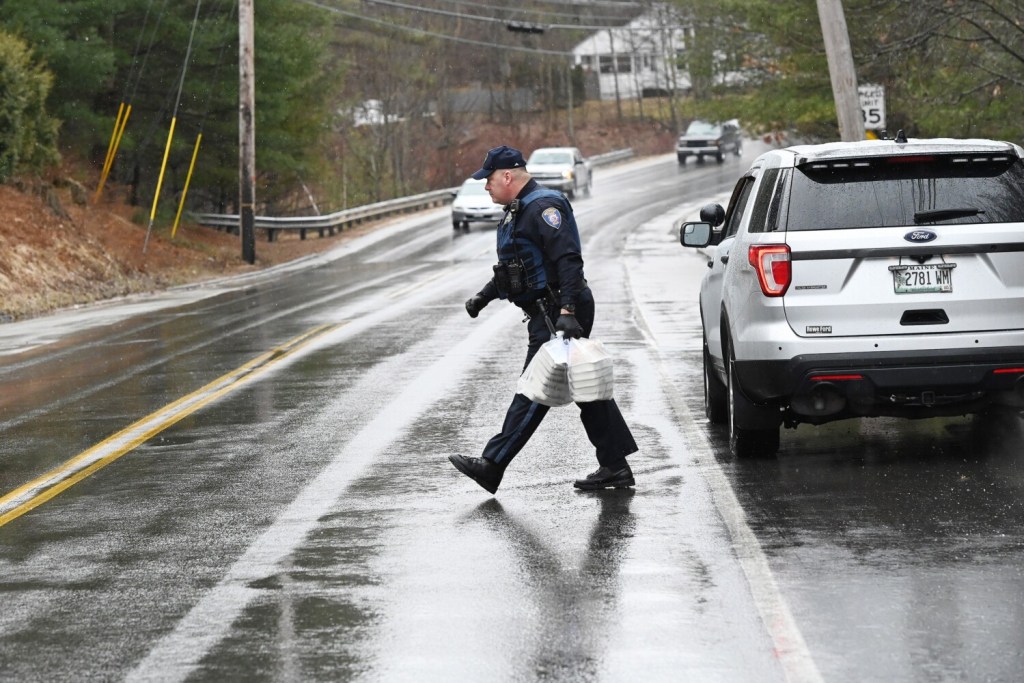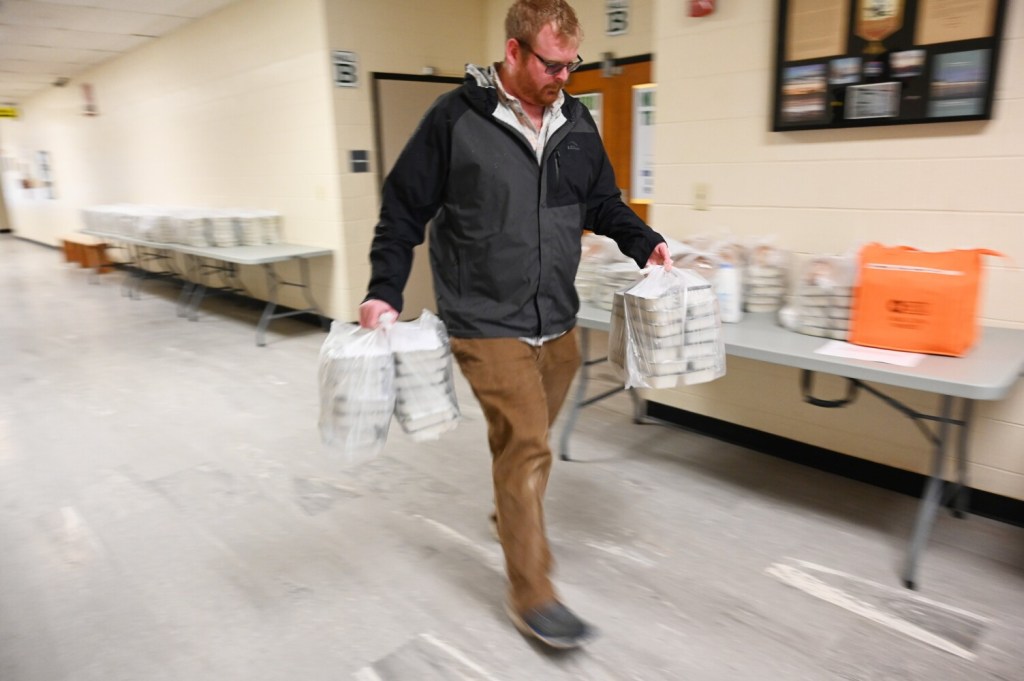When grocery stores starting selling out of toilet paper and rice, Kristen Miale started to get worried.
But Miale wasn’t worried for herself. She is the president of the Good Shepherd Food Bank, which is the largest hunger relief organization in Maine. Food banks across the state will likely be in greater demand than ever as the coronavirus disrupts jobs and schools. But more than 70 percent of the products donated to Good Shepherd and its local partners come from retailers.
“The grocery store shelves are empty, which means they have no food to donate to us,” Miale said.
As the number of coronavirus cases in Maine increases, nonprofits are trying to balance social distancing with social services. And while some programs have no choice but to shut down, others are critical to the emergency response in Maine and are trying to step up while managing already tight budgets and a decline in volunteers to work on the front lines.
“They need to be out there providing services at the same time they may be facing potential layoffs,” said Jennifer Hutchins, executive director of the Maine Association of Nonprofits. “They need to be taking care of people, and they need to be going to work at the same time our leaders are rightly encouraging people to stay home.”
Hutchins said nearly 3,000 charitable nonprofits in Maine file financial reports to the federal government on a regular basis. More than one-third work in the health and human services sector – taking care of people who are elderly, who have a disability or mental health challenges, who are food-insecure.
The impact of the coronavirus will vary by nonprofit.
For some organizations, the most immediate need is volunteers.
The Southern Maine Agency on Aging runs the state’s Meals on Wheels program, which delivers meals to senior citizens. That program has made changes to prevent the spread of disease, but some volunteers have said they are still unable to participate, especially those who are at risk because of their age.
At the same time, more than 700 people receive meals through the program, and more are requesting meal delivery as the cases of coronavirus mount.
“We have had a drop already in our volunteer base due to some folks just not feeling comfortable, due to other folks self-isolating,” said Mary Hadlock, the director of volunteer services at the Southern Maine Agency on Aging.
But Hadlock said Wednesday that the organization had hosted a training webinar for new volunteers, and she hopes those will continue every other day to rebuild the volunteer base with people who are able to help. The Westbrook Police Department and other Westbrook city employees jumped in to help with deliveries last week at the delivery hub for Portland and Westbrook.
“The clients have been receiving their meals this week, both Tuesday and Thursday, with no interruption,” Hadlock said.
Mark Swann, executive director of the Preble Street Resource Center in Portland, said the number of volunteers began to drop off last week at the soup kitchen. Some of the volunteers who dropped out belonged to company groups, which began to prohibit outings. Many are senior citizens who have a higher risk if they get sick with coronavirus. The kitchen is also screening volunteers for their risk of coronavirus, so people who have traveled to certain countries or had contact with a coronavirus patient cannot volunteer.
The kitchen provides more than 1,000 meals a day, and relies on both volunteers and staff to cook and serve. The organization has made certain changes to prevent the spread of disease – for example, extending meal hours and only allowing 50 people in the dining area at one time. Typically, 10 to 15 volunteers work during each meal time. Swann said those numbers have dropped to just a few volunteers at meals.
But he hoped young people in particular would be able to help fill the need in coming weeks.
“We may find volunteers who are temporarily out of work, college students who are home early,” Swann said. “I think there’s positivity.”
Catholic Charities Maine runs two dozen programs in the state. Some, like a dental clinic, were forced to shut down except for emergency services. Others, like a volunteer program to check in on elderly people, have adapted to the disease by relying on phone calls instead of in-person visits. The organization posted fact sheets about coronavirus in multiple languages on its website.
“We’re actually getting a lot of calls from people wanting to know if they can do something to help us,” CEO Steve Letourneau said. “I think that’s something that happens a lot in times of crisis. You see people coming together.”
The financial impact of the coronavirus on Maine nonprofits is mounting but still not quantifiable. But the prospect of a recession and potential drop in giving is adding to those concerns.
Hutchins estimated that nearly 100,000 people work in charitable nonprofits in Maine. Her organization has been lobbying state and federal officials to make sure relief related to the coronavirus will help nonprofits stay open.
For example, charitable nonprofits are asking for relief on payroll taxes rather than income taxes, because their organizations do not pay income taxes.
The threshold for individual tax write-offs for charitable giving has also increased in recent years, so the nonprofit sector is asking Congress to create a universal charitable deduction through 2021 to incentivize people to donate even small amounts in their communities.
“Right now, our priority is communicating with our state and federal leaders to make sure they have the information they need about nonprofits so they can make the best decisions in these hectic times,” Hutchins said.
Shawn Yardley is the CEO of Community Concepts, which provides a range of programs in Androscoggin, Franklin and Oxford counties. Among those services is the largest Head Start child care program in the state, Yardley said, and it shut down Monday. But he got the assurances from the federal funding agency that employees would be paid through the end of April, and they have instead been packing meals for children who typically rely on the food they receive in child care.
“Being a nonprofit, we don’t have big reserves,” Yardley said. “To say it’s keeping me up at night is an understatement because of the uncertainly of it all, how long it will go on. What are the people that we’re serving supposed to do? So we’re anxious to see what comes out of the federal government and how that response will get to the ground.”
Catholic Charities Maine has 600 employees statewide, and more than a third are full time. Letourneau said the organization has been forced to cut some people and hours, although he did not want to estimate how many people would be affected. He said the nonprofit has encouraged people to file unemployment claims if they can.
Letourneau said that he’s constantly worried about “the financial sustainability and viability of our organization.”
The Maine branch of the National Alliance on Mental Illness is actually expanding one program in response to the coronavirus. The organization has a respite program for families with special needs children, which allows primary caregivers a break when needed. NAMI Maine pays the respite provider an hourly wage for that time.
More than 900 families are already enrolled, and the state changed its contract with NAMI Maine last week to increase the number of hours a family can use the respite program in a given month. They are also streamlining the application process for families and respite providers to enroll in the program.
CEO Jenna Mehnert said the goal is to fill gaps in services that were created when schools and child care facilities closed. The organization is working to connect families with people they already know – the ed tech from their child’s school who is no longer getting paid because the district closed, or a relative who lives nearby and wants to help.
“We’re trying to think creatively about how we can help families who have a unique challenge from a mental health perspective,” Mehnert said.
NAMI Maine is scheduled to hosts its biggest fundraiser at the end of May, and Mehnert said she hopes that will go on as usual.
“Every nonprofit right now is worried because recessions hit us the hardest, but we’re going to keep doing what Mainers need,” Mehnart said.
Many nonprofit leaders said fundraising is on hold as they triage their response to the coronavirus. But Miale said Good Shepherd Food Bank has been asking for donations because they might need to start buying more food than usual, and she doesn’t know how far she can stretch the cash reserves.
“It’s all going to depend on how long this lasts, if this really drags on and we start seeing the economic impact of many people losing their jobs,” she said.
“People won’t have that extra $25 to donate to the food bank, and we’re going to see more people needing our services. For right now, we’re feeling OK, but we are concerned about how long it lasts.”
Staff Writer Kelley Bouchard contributed to this report.
Comments are not available on this story.
Send questions/comments to the editors.


